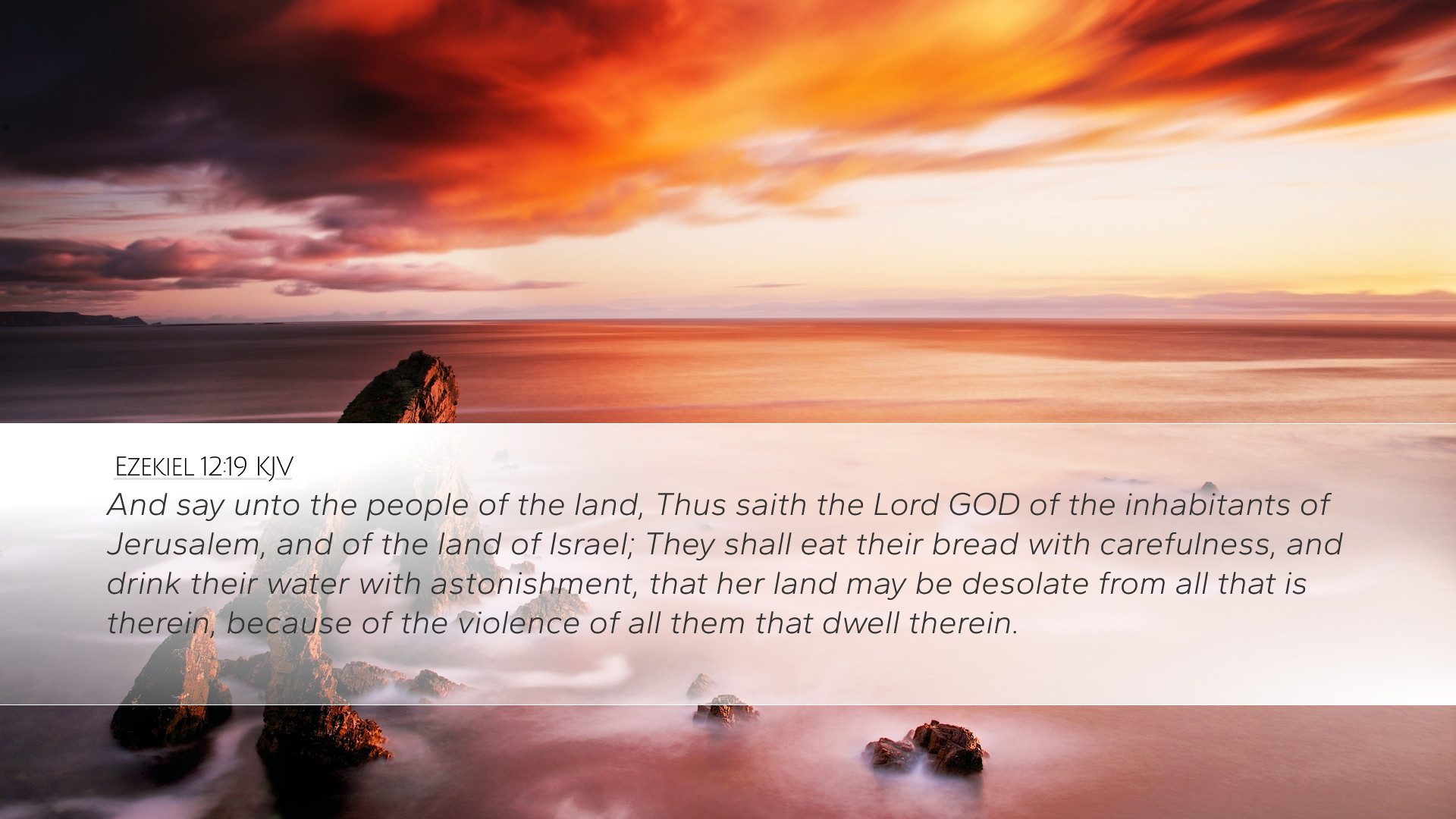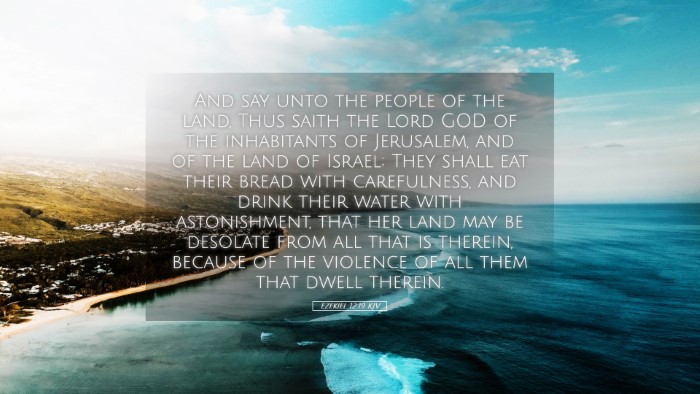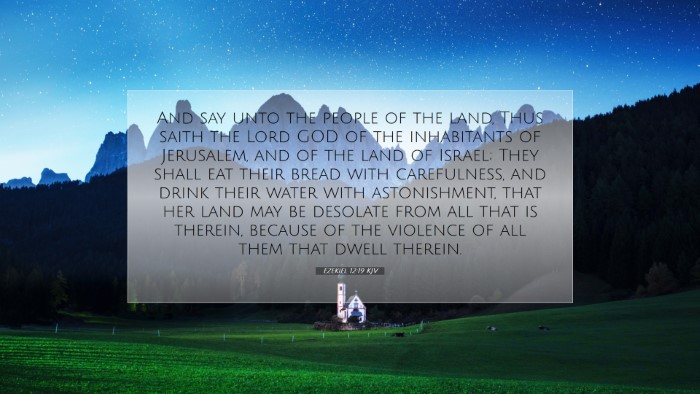Bible Commentary on Ezekiel 12:19
Ezekiel 12:19 states: "And say unto the people of the land, Thus saith the Lord God of the inhabitants of Jerusalem, and of the land of Israel; They shall eat their bread with carefulness, and drink their water with astonishment, that her land may be desolate from all that is therein, because of the violence of all them that dwell therein."
Introduction
This verse serves as a profound warning from God to the inhabitants of Jerusalem and the land of Israel, highlighting the severity of the impending calamity due to their disobedience. In this commentary, we will delve into the insights offered by public domain commentators Matthew Henry, Albert Barnes, and Adam Clarke, examining the implications of this prophecy in the context of divine judgment and human behavior.
Contextual Overview
The context of Ezekiel 12 is crucial for understanding verse 19. This chapter is part of a larger section where God, through Ezekiel, emphasizes the coming judgment upon Jerusalem for its iniquities. The prophet uses symbolic actions to communicate the impending doom, serving as a stark reminder to the people of their need for repentance.
Matthew Henry’s Insight
Matthew Henry points out that this verse illustrates the psychological and emotional state of the people after their punishment. He emphasizes that the manner in which they will eat and drink—"with carefulness" and "with astonishment"—indicates a profound level of fear and anxiety regarding their dire circumstances. Henry interprets this to mean that the Israelites will experience a heightened awareness of their vulnerability and the reality of their situation. He states:
"They will not eat nor drink with cheerfulness, but with fear and trembling, reflecting on the desolation that has come upon them."
Albert Barnes' Perspective
Albert Barnes elaborates on the social and physical implications of this verse, noting that the carefulness and astonishment mentioned are indicative of a society in turmoil. He explains that the very act of eating and drinking, which is often a source of joy and community, will become laden with dread. Barnes asserts:
"The people had failed to heed the warnings of the prophets, and as a result, their sustenance will now serve as a grim reminder of their plight, reflecting the broader desolation wrought by violence and sin."
He further highlights that God’s declaration signifies the loss of normalcy in their daily lives, transforming even the most basic activities into acts filled with sorrow and regret.
Adam Clarke’s Interpretation
Adam Clarke adds depth to the discussion by exploring the moral implications associated with the actions of the people. He emphasizes that the perceived care with which they consume their food signifies a deep recognition of their guilt and the just consequences of their actions. Clarke comments on the phrase "bread with carefulness" as follows:
"It denotes a sense of anxiety that arises from spiritual desolation and division among the people, compounded by the fears of the violence they have endured."
Clarke also notes the importance of recognizing the role violence plays in this equation; he argues that their societal decay is a direct result of moral failings that have pervaded the community, leading to God's judgment.
Theological Implications
This verse serves as a powerful reminder of the themes of divine justice and mercy. The anxious state of those described in Ezekiel 12:19 reflects a theological reality: that disobedience to God leads to severe consequences. The insights from the commentators illustrate how the emotional states of the people are intimately tied to their spiritual lives.
The Significance of Carefulness
The notion of eating "with carefulness" suggests a profound shift from abundance to scarcity—a poignant reminder that the blessings of God can be transformed into curses when His commands are disregarded. This carefulness can be viewed as:
- A Reflection of Guilt: An acknowledgment of their past disobedience.
- A Catalyst for Repentance: An opportunity for the people to turn back to God in humility.
- A Warning to Future Generations: A call to recognize the seriousness of sin and its consequences.
Astounding Living Conditions
The term "drink their water with astonishment" resonates with profound implications. The spiritual and physical nourishment that once characterized joyful existence has now morphed into a fearful act. Here, water symbolizes life and sustenance, and its consumption with astonishment indicates:
- Loss of Identity: The nation’s identity is stripped away due to its rebellion.
- Awareness of Judgment: The people are acutely aware of the consequences of their moral failures.
- The Need for Restoration: Emphasizes the longing for divine restoration among the exiled community.
Conclusion
Ezekiel 12:19 serves as a chilling yet vital reminder of the severity of God's judgment and the profound effects that disobedience can have on a community. In synthesizing contributions from Matthew Henry, Albert Barnes, and Adam Clarke, we observe a comprehensive theological insight that underscores the seriousness of sin, the need for repentance, and the realities of living under divine judgment.
For pastors, students, theologians, and Bible scholars, this passage calls for a deeper examination of collective and individual faithfulness. It challenges all who read it to reflect on their spiritual state, the nature of their relationship with God, and the implications of living in a world where the consequences of sin can manifest in everyday life.


